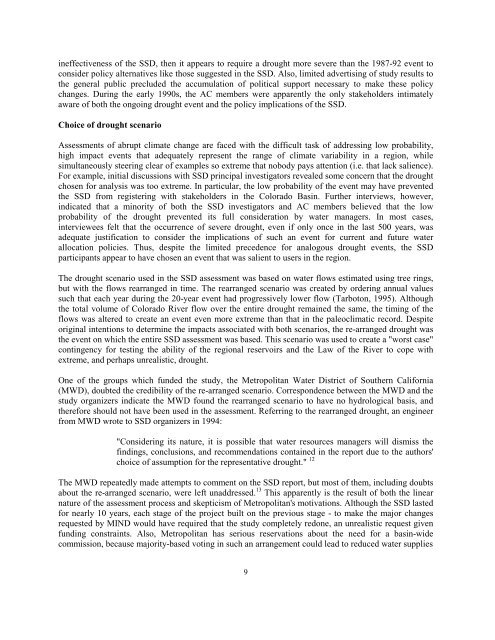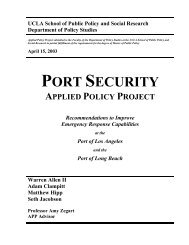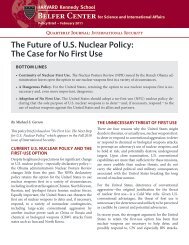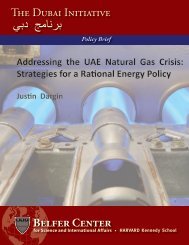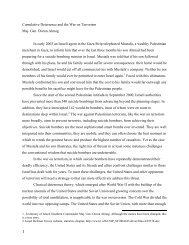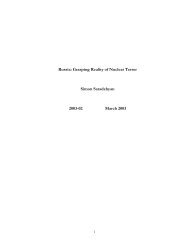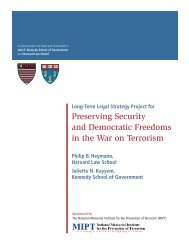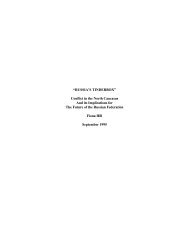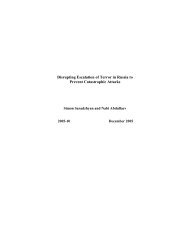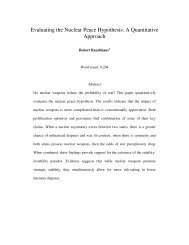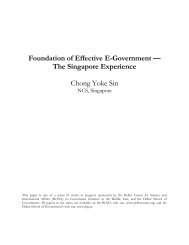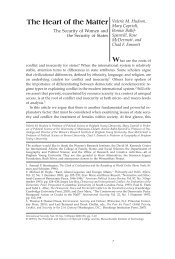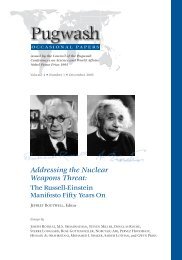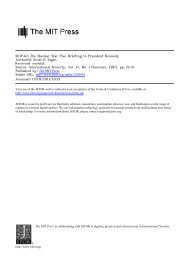Global Environmental Assessment Project - Belfer Center for ...
Global Environmental Assessment Project - Belfer Center for ...
Global Environmental Assessment Project - Belfer Center for ...
You also want an ePaper? Increase the reach of your titles
YUMPU automatically turns print PDFs into web optimized ePapers that Google loves.
ineffectiveness of the SSD, then it appears to require a drought more severe than the 1987-92 event to<br />
consider policy alternatives like those suggested in the SSD. Also, limited advertising of study results to<br />
the general public precluded the accumulation of political support necessary to make these policy<br />
changes. During the early 1990s, the AC members were apparently the only stakeholders intimately<br />
aware of both the ongoing drought event and the policy implications of the SSD.<br />
Choice of drought scenario<br />
<strong>Assessment</strong>s of abrupt climate change are faced with the difficult task of addressing low probability,<br />
high impact events that adequately represent the range of climate variability in a region, while<br />
simultaneously steering clear of examples so extreme that nobody pays attention (i.e. that lack salience).<br />
For example, initial discussions with SSD principal investigators revealed some concern that the drought<br />
chosen <strong>for</strong> analysis was too extreme. In particular, the low probability of the event may have prevented<br />
the SSD from registering with stakeholders in the Colorado Basin. Further interviews, however,<br />
indicated that a minority of both the SSD investigators and AC members believed that the low<br />
probability of the drought prevented its full consideration by water managers. In most cases,<br />
interviewees felt that the occurrence of severe drought, even if only once in the last 500 years, was<br />
adequate justification to consider the implications of such an event <strong>for</strong> current and future water<br />
allocation policies. Thus, despite the limited precedence <strong>for</strong> analogous drought events, the SSD<br />
participants appear to have chosen an event that was salient to users in the region.<br />
The drought scenario used in the SSD assessment was based on water flows estimated using tree rings,<br />
but with the flows rearranged in time. The rearranged scenario was created by ordering annual values<br />
such that each year during the 20-year event had progressively lower flow (Tarboton, 1995). Although<br />
the total volume of Colorado River flow over the entire drought remained the same, the timing of the<br />
flows was altered to create an event even more extreme than that in the paleoclimatic record. Despite<br />
original intentions to determine the impacts associated with both scenarios, the re-arranged drought was<br />
the event on which the entire SSD assessment was based. This scenario was used to create a "worst case"<br />
contingency <strong>for</strong> testing the ability of the regional reservoirs and the Law of the River to cope with<br />
extreme, and perhaps unrealistic, drought.<br />
One of the groups which funded the study, the Metropolitan Water District of Southern Cali<strong>for</strong>nia<br />
(MWD), doubted the credibility of the re-arranged scenario. Correspondence between the MWD and the<br />
study organizers indicate the MWD found the rearranged scenario to have no hydrological basis, and<br />
there<strong>for</strong>e should not have been used in the assessment. Referring to the rearranged drought, an engineer<br />
from MWD wrote to SSD organizers in 1994:<br />
"Considering its nature, it is possible that water resources managers will dismiss the<br />
findings, conclusions, and recommendations contained in the report due to the authors'<br />
choice of assumption <strong>for</strong> the representative drought." 12<br />
The MWD repeatedly made attempts to comment on the SSD report, but most of them, including doubts<br />
about the re-arranged scenario, were left unaddressed. 13 This apparently is the result of both the linear<br />
nature of the assessment process and skepticism of Metropolitan's motivations. Although the SSD lasted<br />
<strong>for</strong> nearly 10 years, each stage of the project built on the previous stage - to make the major changes<br />
requested by MIND would have required that the study completely redone, an unrealistic request given<br />
funding constraints. Also, Metropolitan has serious reservations about the need <strong>for</strong> a basin-wide<br />
commission, because majority-based voting in such an arrangement could lead to reduced water supplies<br />
9


